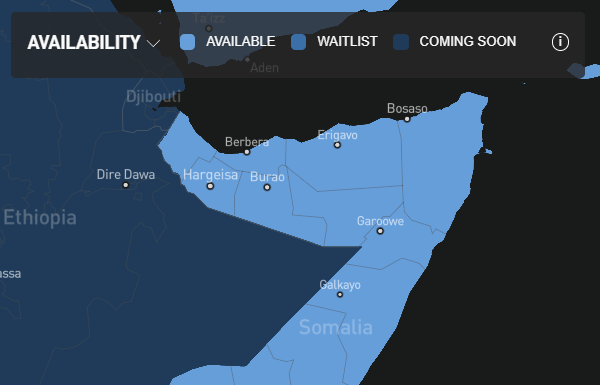Starlink Sides with Somalia, Snubs Somaliland and UAE
The launch represents yet another setback for Abu Dhabi in Africa.
SpaceX’s Starlink has launched in Somalia, offering high-speed internet services after securing regulatory approval in April. Somalia’s National Communications Authority (NCA) has granted the company a licence for a 10-year operating period. The move is widely seen as a strategic step to align more closely with US President Trump, amid Washington’s intensified push for Somaliland’s recognition. However, Starlink’s decision to operate under Somalia’s federal licence effectively signals de facto approval of Somalia’s territorial claims over the breakaway region. More broadly, the development represents yet another setback for the Emirati agenda in Africa.
Unified Connectivity
Somalia becomes the twenty-fifth African country to receive Starlink services, following the company’s initial rollout across the continent in 2023. Internet coverage will extend across the entire nation, reaching both rural and urban areas, aiming to improve connectivity in one of Africa’s least connected countries, where over 70% of the population lacks reliable broadband access. That said, Starlink is not expected to pose a significant threat to local telecom providers, as the pricing remains niche: a monthly subscription of $49, with an upfront hardware fee of $499 for the Starlink Kit.
Somaliland has criticised the launch, which showcases unified connectivity across the Horn of Africa. The breakaway region is demanding a separate agreement, with some officials claiming that Starlink devices are not yet available in Somaliland.
The move reflects a contradictory stance in Washington, as Trump-aligned groups are actively advocating for Somaliland’s recognition — both as a hedge against US vulnerabilities in Djibouti and as a pathway to securing strategic assets, such as a military base in Berbera and access to rare earth minerals. Somaliland’s president has even suggested that recognition is “on the horizon” following talks with Trump officials, offering naval basing rights near the Bab al-Mandab Strait in exchange. However, Starlink’s rollout under Somalia’s federal licence has cast doubt over the future of the breakaway region.
Another Loss for Abu Dhabi
Starlink’s launch and its de facto recognition of Somalia’s federal government as the sole authority over the Horn of Africa complicates Emirati ambitions in the region. Abu Dhabi is heavily invested in securing Red Sea trade routes and access to critical resources in Sudan and across the African continent. The UAE has poured resources into Somaliland, managing Berbera port through DP World since 2016, establishing a military base, and training local forces to counter rivals like Qatar and Turkey, who support Somalia’s central government. This Starlink snub reinforces federal Somalia’s claims, potentially jeopardising the UAE’s strategic footholds and escalating tensions in a region where Abu Dhabi seeks to offset Iranian and Houthi threats. It echoes UAE’s alleged role in Sudan’s conflict, where it backs the Rapid Support Forces (RSF) with arms and reportedly facilitates Starlink black markets, drawing international scrutiny and complicating broader African investments.
Its most recent setback came in Guinea, where a major mining concession was revoked. After heavy investment in the country, the UAE’s aluminium ambitions were abruptly curtailed, with no compensation offered. The move reflects a broader pattern of resource nationalisation across Africa, from Niger’s takeover of the uranium sector to Mali’s seizure of foreign-owned gold mines. The trend underscores the urgent need for a recalibration of Abu Dhabi’s African strategy.



